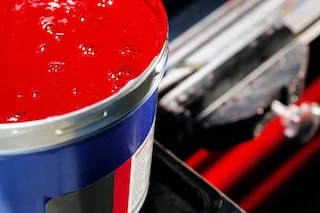When facing capacity constraints or dealing with unfamiliar paint chemistries, paint manufacturers often consider utilizing a toll paint producer.
While some shy away from toll paint producers due to perceived added expenses, working with the right partner can actually provide cost savings in certain circumstances. In evaluating whether your organization should outsource some of its paint production, keep the costs and factors discussed below in mind.
Generally, the costs associated with outsourcing a paint manufacturing project or keeping it in-house are the same other than the fee the toll paint producer charges. The question you must answer is whether the toller offers cost savings on raw materials, production efficiency, and other advantages.
|
Outsource To Toll Paint Producer
|
Keep Paint Production In-House
|
Raw Materials
Raw materials typically make up between 45 and 55 percent of a paint’s production cost. For the raw materials used in the potentially outsourced product, how strong is your purchasing power? Is your possible paint manufacturing partner already using any of these raw materials? If so, they could combine purchases and minimize raw material costs associated with your formulation.
For example, if a company sells epoxy coatings and wants to start offering a urethane topcoat, this will involve purchasing new-to-the-company resin, driers, and maybe even vendors. Partnering with a company with existing relationships with urethane resin and additive vendors would be advantageous. Buying raw materials in bulk rather than in standard quantities typically reduces costs by 5-7 percent.
Paint Production Costs
Scaled raw material purchasing isn’t the only potential cost saving mechanism when working with a toll paint manufacturer. The efficiency (or lack thereof) of a coatings production operation can either minimize or escalate manufacturing costs. A few questions to keep in mind:
- What quality control methods are necessary for this paint formulation? Which company will be able to manufacture batches with the fewest adjustments necessary? For example, if color matching is part quality control, the shade pastes used for adjusting a batch’s off-spec color can be exorbitantly expensive.
- How much yield loss are you projecting with each batch of paint? Is your toll manufacturing partner expecting less? While yield loss is a necessary evil of any paint manufacturing process, minimizing it can lead to substantial savings, especially with complex industrial coating formulations.
- How difficult is the formulation to manufacture? Which organization is best situated to avoid blown batches? How much will a blown batch of this formulation cost to the bottom line? Especially with lower-margin products, blowing a batch can jeopardize a product’s profitability. Coatings that are difficult to manufacture or have thinner margins are good outsourcing candidates.
- Do you have the equipment necessary to allow for optimal production and batch sizes? If not, you’re likely to spend more on labor and work-in-process inventory. Partnering with a toll manufacturer with equipment to accommodate your paint’s properties and batch sizes could have a dramatic effect on your cost per gallon.
Environmental, Safety, and Insurance Considerations
Especially on the manufacturing side, the paint and coatings industry is wrought with regulations. If you’re considering manufacturing a coating, does your organization have the necessary operating permits for your equipment? If not, can you and your customers wait six months to a year to produce your coating while your operating permit is being processed? Is your organization sufficiently insured to manufacture, fill, and store the product? Is your workforce trained to safely handle any hazardous materials in the formulation? If you answered no to any of these questions, consider a toll paint producer, as these issues can be expensive and time consuming to resolve.
While no paint company necessarily wants to pay another paint manufacturer to produce its paint, if a toll producer can offer savings on raw material costs and add production efficiency valued in excess of its tolling charge, a toll paint production partnership may be the way to go!

